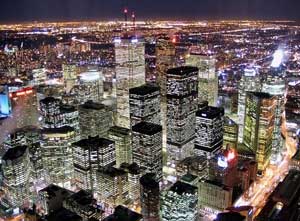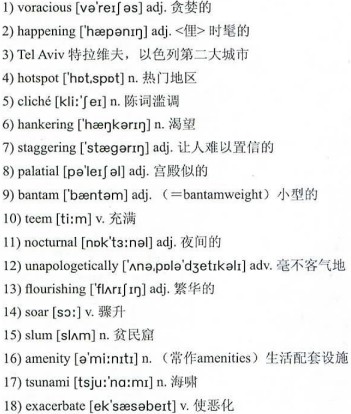我们的城市: 脆弱而贪婪 Our Cities: 1)Voracious and Vulnerable
文字难度:★★★
 City dwellers tend to call themselves “urban animals”. Chic nightclubs, cool people, convenient transportation, diverse festivals, and 2)happening restaurants are just a few of the factors that combine to make a city worthy of all tomorrow’s parties. From New York to 3)Tel Aviv, London to Berlin, Tokyo to Shanghai, Mexico City to Sao Paulo, many 4)hotspots offer an array of sinful reasons to turn people toward the pursuit of pleasure. 5)Cliché or not, city life is a must-have for people with a 6)hankering for naughtiness and fun.
City dwellers tend to call themselves “urban animals”. Chic nightclubs, cool people, convenient transportation, diverse festivals, and 2)happening restaurants are just a few of the factors that combine to make a city worthy of all tomorrow’s parties. From New York to 3)Tel Aviv, London to Berlin, Tokyo to Shanghai, Mexico City to Sao Paulo, many 4)hotspots offer an array of sinful reasons to turn people toward the pursuit of pleasure. 5)Cliché or not, city life is a must-have for people with a 6)hankering for naughtiness and fun.
When I was residing in Mexico City it seemed to me that silence was one thing the city had never had. With the second largest metro system in North America (after New York), a 7)staggering array of both 8)palatial and 9)bantam nightclubs, late-night restaurants, and elegant lounges and bars, Mexico City is 10)teeming with countless forms of 11)nocturnal bliss—and12)unapologetically lawless when it comes to its nightlife.
However, just as it was luring back travelers with cool new hotels, a 13)flourishing and contemporary art scene, and semi-endurable pollution levels, Mexico’s escalating crime due to over-population, increased housing shortages, and many other problems became front-page news. And Mexico City is not the only place struggling—in an urban age, things are going wild. Housing prices are 14)soaring with increased demand, so many urban poor are living in 15)slums where water and sanitation facilities are inadequate, and living conditions are crowded and unhealthy. They may be far from their sources of income and essential 16)amenities. In Asia and the Pacific, two out of five urban dwellers live in slums, compared with three out of five in Africa.
Cities occupy 2% of the earth’s surface, yet urban areas account for 75% of all energy use, and 80% of all greenhouse gas emissions. But although cities are voracious consumers, they are also vulnerable to the effects of this consumption. Many major Asian cities are near bodies of water—on the coast or along rivers and lakes—making them vulnerable to natural disasters such as floods or 17)tsunamis. This is often 18)exacerbated by the pressures of development and climate change.
城市居民往往把自己称为“都市动物”。时髦的夜总会、打扮得酷酷的人们、便利的交通、各类节日、潮流热门餐馆,这些仅是城市热闹喧嚣引人流连的小部分构成因素。从纽约、特拉维夫、伦敦、柏林、东京、上海、墨西哥城到圣保罗,都有众多热点场所提供一连串“罪恶”的理由让人们一心寻欢作乐。俗套也得说一句,对于那些渴望肆意寻乐的人来说,城市生活是一种必须的体验。
我在墨西哥城住的时候觉得,宁静似乎是这个城市从不曾拥有的东西。墨西哥城有着北美地区第二大地铁系统(仅次于纽约市),既有富丽堂皇如皇宫般的大夜总会,也有小型夜店,还有开至深夜的餐馆、雅致的酒吧等娱乐场所,蔚为奇观,墨西哥城的夜生活方式繁多,多姿多彩,毫不客气地说一句,简直是无法无天了。
然而,在凭借新潮时尚的旅店、繁华的当代艺术场景、让人勉强能忍受的环境污染程度吸引着旅客回头的同时,由于人口膨胀而激增的犯罪率、房屋日渐短缺及别的许多问题都成为墨西哥城的报纸头条。而墨西哥城还不只是世界上唯一一座身陷麻烦的城市——在这个“城市时代”,一切都变得不受控制。随着房屋需求的剧增,房价也急升,许多“城市贫民”都生活在贫民窟,水资源不足,卫生设施都不完善,而生活环境也是拥挤不堪,不利健康。他们很可能要到外地打工赚取收入,也缺乏基本的生活配套设施。在亚太地区,有五分之二的城市居民生活在贫民窟,而这个数字在非洲是五分之三。
城市虽只占地球表面2%的面积,其能源使用量却占了总能源使用量的75%,且80%的温室气体都排自城市。但是,城市一方面狂耗能源,另一方面也因而变得脆弱。亚洲的许多主要城市都临近水域——在海岸线上或在河流、湖泊的边沿——这导致其易受诸如洪水这些自然灾害的攻击,而城市发展及气候变化所带来的压力常常使其变得更脆弱。
And urbanization hasn’t stopped yet. It is said that 50% of people were living in cities in 2007, while it was just 14% 100 years ago. This urbanization is occurring at a very rapid rate—it is estimated that 75% of the global population will live in urban areas by 2050, with 120,000 people moving into cities every week in Asia.
“Cities are not just concentrations of problems, but they are also where problems can be solved.” said Ricky Burdett, the author of 19)The Endless City. In an urban age, creative, 20)inclusive, sustainable cities can make all the difference.
Cities which utilize their entire talent pool, use their resources wisely, develop in harmony with their surroundings, and encourage imaginative thinking have a clear advantage. To attract talent and economic activity to them, they must offer quality of life, as well as opportunities for social engagement and personal development. The challenges they present are in their size and their sheer number of inhabitants which, if managed poorly, can have a 21)catastrophic impact. But within these challenges lie opportunities for innovation and new industries to help people prepare for an evolving world.
While the pressures created by their size are serious, cities offer the most diverse pools of knowledge and skills to solve problems and tackle projects. High density allows us to concentrate resources, so that small changes and investments in infrastructure in a relatively confined area can have a big impact. And while the cities themselves have heavy footprints, individual city dwellers often have a lighter impact on the environment than their rural counterparts, particularly where there is access to efficient public transport and well-planned housing.
More so than ever before, the shape of cities—how much land they occupy, how much energy they consume, how their transport infrastructure is organized, and where people are housed, in remote, 22)segregated environments behind walls or in integrated neighbourhoods close to jobs, facilities, and transport—affects the environmental, economic, and social development of global society. So, in truth, cities are not just about colourful nightclubs and convenient transportation. They are connected with our lives.
而城镇化进程并未就此打住。据统计,2007年,地球上有50%的人居住在城市里,然而100年前,这个数字仅为14%。城镇化进程正加速推进,亚洲现在每周就有12万人往城市移居,据估计,到2050年为止,全球将有75%的人口居住在城市里。
“城市也并非只是问题的集中地,在那里问题也可以被解决。”《无尽之城》一书的作者里奇·布尔德特说道。在“城市时代”里,具有创造力、包容力及韧力的城市将创造出一番新天地。
城市要是能最大限度地利用自身人才库,精明地使用自身资源,与周边环境和谐共处,鼓励创新思维,那这样的城市就有着明显的优势。它们必须提供高质量的生活、社会参与及个人发展机会,才能吸引人才,促进自身的经济发展。它们面临的挑战源自自身规模及居民人口——如果把控得不好,则可能引发灾难性后果——但在这些挑战中存有革新及发展新型产业的机会,使得人们做好准备,适应不断向前发展的世界。
尽管自身规模所带来的压力是个严肃的问题,但城市提供了解决问题及开展项目所需的最多样的知识及技能。人口密度高这样的问题使得我们能集中资源,那么,在资源相对有限的地区,基础设施方面的小改变或小投资都有着深远影响。并且,尽管城市在地球上留下的“足迹”很深,城市居民个体对环境的影响通常比农村居民个体要小,特别是居住在交通运输发达、住房规划良好的城市里的居民(编者注:就整体而言,城市居民对环境的影响是比农村居民要大的,但就个人而言,因为城市居民共同使用公共设施,所以他们的个体影响比农村居民要小)。
相比以往,如今城市的状态——土地面积、能耗、交通基础设施构建、居民住房状况(在远郊孤离隔涉的高墙下的居民区,抑或是在邻近工作地点、设施齐备、交通发达的完善的居民区)——对整个社会的环境、经济、社会发展影响更大了。事实上,城市不仅意味着诱人的夜总会及便利的交通,城市其实和我们的生活紧密相连。


![]()
